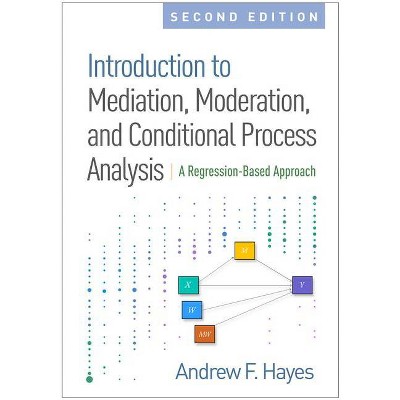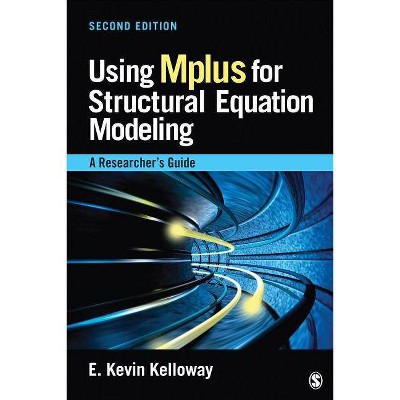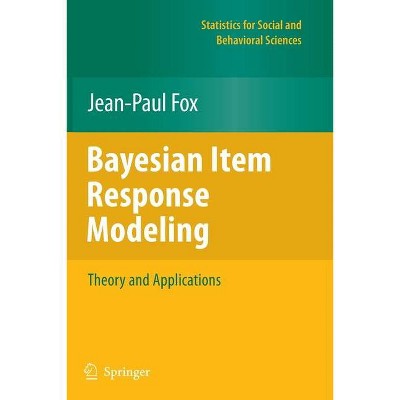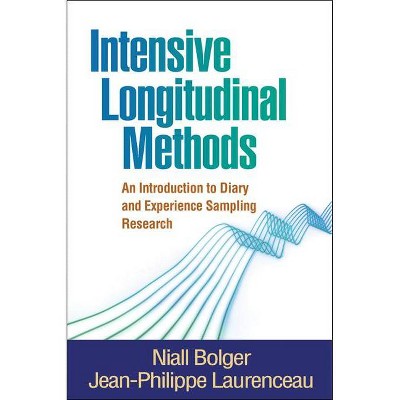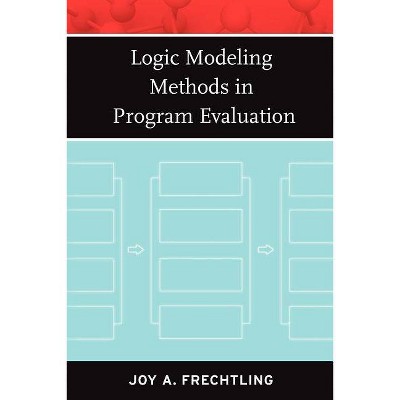Principles and Practice of Structural Equation Modeling - (Methodology in the Social Sciences) 4th Edition,Annotated by Rex B Kline (Paperback)
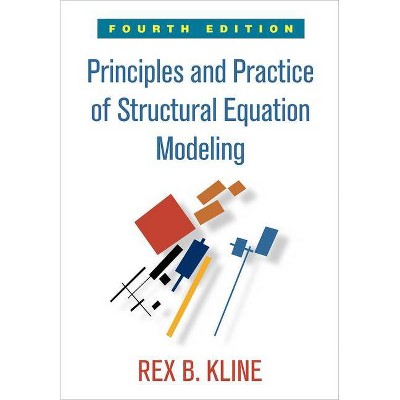
Similar Products
Products of same category from the store
AllProduct info
<p/><br></br><p><b> About the Book </b></p></br></br>Emphasizing concepts and rationale over mathematical minutiae, this is the most widely used, complete, and accessible structural equation modeling (SEM) text. Continuing the tradition of using real data examples from a variety of disciplines, the significantly revised fourth edition incorporates recent developments such as Pearl's graphing theory and the structural causal model (SCM), measurement invariance, and more. Readers gain a comprehensive understanding of all phases of SEM, from data collection and screening to the interpretation and reporting of the results. Learning is enhanced by exercises with answers, rules to remember, and topic boxes. The companion website supplies data, syntax, and output for the book's examples--now including files for Amos, EQS, LISREL, Mplus, Stata, and R (lavaan). <br> New to This Edition<br> *Extensively revised to cover important new topics: Pearl's graphing theory and the SCM, causal inference frameworks, conditional process modeling, path models for longitudinal data, item response theory, and more.<br> *Chapters on best practices in all stages of SEM, measurement invariance in confirmatory factor analysis, and significance testing issues and bootstrapping.<br> *Expanded coverage of psychometrics.<br> *Additional computer tools: online files for all detailed examples, previously provided in EQS, LISREL, and Mplus, are now also given in Amos, Stata, and R (lavaan).<br> *Reorganized to cover the specification, identification, and analysis of observed variable models separately from latent variable models. <br> Pedagogical Features<br> *Exercises with answers, plus end-of-chapter annotated lists of further reading.<br> *Real examples of troublesome data, demonstrating how to handle typical problems in analyses.<br> *Topic boxes on specialized issues, such as causes of nonpositive definite correlations.<br> *Boxed rules to remember.<br> *Website promoting a learn-by-doing approach, including syntax and data files for six widely used SEM computer tools.<p/><br></br><p><b> Book Synopsis </b></p></br></br>Emphasizing concepts and rationale over mathematical minutiae, this is the most widely used, complete, and accessible structural equation modeling (SEM) text. Continuing the tradition of using real data examples from a variety of disciplines, the significantly revised fourth edition incorporates recent developments such as Pearl's graphing theory and the structural causal model (SCM), measurement invariance, and more. Readers gain a comprehensive understanding of all phases of SEM, from data collection and screening to the interpretation and reporting of the results. Learning is enhanced by exercises with answers, rules to remember, and topic boxes. The companion website supplies data, syntax, and output for the book's examples--now including files for Amos, EQS, LISREL, Mplus, Stata, and R (lavaan). <p/> New to This Edition <br> *Extensively revised to cover important new topics: Pearl's graphing theory and the SCM, causal inference frameworks, conditional process modeling, path models for longitudinal data, item response theory, and more. <br> *Chapters on best practices in all stages of SEM, measurement invariance in confirmatory factor analysis, and significance testing issues and bootstrapping. <br> *Expanded coverage of psychometrics. <br> *Additional computer tools: online files for all detailed examples, previously provided in EQS, LISREL, and Mplus, are now also given in Amos, Stata, and R (lavaan). <br> *Reorganized to cover the specification, identification, and analysis of observed variable models separately from latent variable models. <p/> Pedagogical Features <br> *Exercises with answers, plus end-of-chapter annotated lists of further reading. <br> *Real examples of troublesome data, demonstrating how to handle typical problems in analyses. <br> *Topic boxes on specialized issues, such as causes of nonpositive definite correlations. <br> *Boxed rules to remember. <br> *Website promoting a learn-by-doing approach, including syntax and data files for six widely used SEM computer tools.<p/><br></br><p><b> Review Quotes </b></p></br></br><br>"Kline is a master at explaining complex concepts in a very accessible manner. It is refreshing to see a new edition of an important book that truly is new, not simply redesigned. The fourth edition successfully incorporates recent developments in SEM and contemporary forms of causal reasoning and analysis, such as the SCM. Unlike most SEM texts, this book is notable for making a sophisticated, often-difficult statistical technique understandable to non-statisticians without watering down the material. Kline makes excellent use of relevant statistical theory without overwhelming the reader with algebraic matrices, proofs, formulas, and statistical notations. I recommend this book without reservation to researchers, instructors, and students in the social and behavioral sciences. It is far more than an introduction to SEM--in my opinion, it is a potential catalyst for reconsidering the statistical methods that researchers apply to better understand human action and interaction."--Chris L. S. Coryn, PhD, Director, Interdisciplinary PhD in Evaluation, Western Michigan University <p/> "Too often, new editions of statistics books do not have substantive changes, but that is not the case here--Kline has made significant improvements to an already excellent book. Staying current is particularly necessary in SEM, where the theory has been developing rapidly in the last 10 years, yielding, for example, better estimation methods for categorical data and Bayesian methods. Helpful features include the topic boxes, which allow detailed discussion of particular topics without interfering with the overall flow of the text. I also like the exercises at the end of each chapter, which highlight the important parts of the chapter and provide crucial learning opportunities. Kline's use of the companion website to distribute real examples is excellent. After reading about the models and analyses, it is helpful--actually vital--to be able to practice running the models in various software packages."--Craig S. Wells, PhD, Department of Educational Policy, Research, and Administration, University of Massachusetts Amherst <p/> "The best place to start for anyone who wants to learn the basics of SEM. The text emphasizes applied SEM content without relying on statistical formulas and the writing is clear and well organized, which is very helpful for students. I appreciate having exercises with answers that students can complete and check on their own. The examples are very helpful, and reflect the fact that real data are often troublesome. The website is easy to use and more extensive than for many other books."--Donna Harrington, PhD, University of Maryland School of Social Work <p/> "The incorporation of Pearl's approach to causal inference is a major improvement in the fourth edition. This is the most useful introductory SEM book out there. I have recommended this book to colleagues for both personal and class use, and will continue to do so."--Richard K. Wagner, PhD, Robert O. Lawton Distinguished Professor of Psychology, Florida State University; Associate Director, Florida Center for Reading Research <p/> "This book is unique in that it treats structural equation models for what they are--carriers of causal assumptions and tools for causal inference. Gone are the inhibitions and trepidation that characterize most SEM texts in their treatments of causal inference. Overall, the book elevates SEM education to a new level of modernity and promises to usher in a renaissance for a field that pioneered causal analysis in the behavioral sciences."--Judea Pearl, PhD, Department of Computer Science, University of California, Los Angeles<br><br>"Perfectly addresses the needs of social scientists like me without formal training in mathematical statistics....Can be read by any graduate in psychology or even by keen undergraduates interested in exploring new vistas. Yet it will also constitute a surprisingly good read for experienced researchers in search of some refreshing insights in their favorite techniques....A real tour de force....Succeeds in reconciling comprehensiveness and comprehensibility."<i> </i>(on the second edition)-- "The Psychologist" (4/6/2015 12:00:00 AM)<br><br>"The greatest strength of this book is Kline's ability to present materials in an engaging, accessible manner. In nearly all situations, Kline is able to describe even the more complex material in practical, jargon-free terms....In this regard, this book is unparalleled, and I suspect that this strength alone will make this the book of choice for many who are eager to learn SEM but who do not possess extensive quantitative backgrounds...This book could be readily adapted to courses for students with a basic understanding of correlation and regression or as part of a course for more advanced students."<i></i> (on the second edition)-- "PsycCRITIQUES" (4/6/2015 12:00:00 AM)<br><br>"This wonderfully written book is an impressive introduction to structural equation models (SEM) containing a sharp mix of expert analysis and observations....Contains important resources for both theoretical and applied researchers interested in SEMs...Appropriate as a text for graduate students and a reference for researchers, providing both audiences with valuable insight into the subject matter.."<i></i> (on the second edition)-- "Journal of the American Statistical Association" (4/6/2015 12:00:00 AM)<br><p/><br></br><p><b> About the Author </b></p></br></br>Rex B. Kline, PhD, is Professor of Psychology at Concordia University in Montréal. Since earning a doctorate in clinical psychology, he has conducted research on the psychometric evaluation of cognitive abilities, behavioral and scholastic assessment of children, structural equation modeling, training of researchers, statistics reform in the behavioral sciences, and usability engineering in computer science. Dr. Kline has published a number of books, chapters, and journal articles in these areas. His website is <i>http: //tinyurl.com/rexkline</i>.
Price History
Cheapest price in the interval: 66 on November 6, 2021
Most expensive price in the interval: 66 on February 4, 2022
Price Archive shows prices from various stores, lets you see history and find the cheapest. There is no actual sale on the website. For all support, inquiry and suggestion messagescommunication@pricearchive.us
